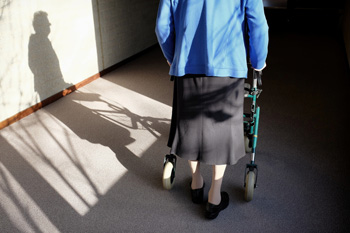 Research has indicated that it is beneficial to implement strategies that can be helpful in preventing falling. This is crucial as the aging process occurs, and may be beneficial in avoiding painful injuries. When gentle exercises are frequently performed, the body may become stronger, and falling may be prevented. Additionally, taking vitamin D on a daily basis may help to minimize a bone density deficiency. Other ways to prevent falling may include removing any loose carpeting in the living area, and installing grab bars in the toilet and shower area. Many elderly patients are aware of the importance of regularly checking their vision, which helps to determine how well objects are seen that may be in their way of walking. If you would like additional information about how falling can affect the feet, please speak with a podiatrist.
Research has indicated that it is beneficial to implement strategies that can be helpful in preventing falling. This is crucial as the aging process occurs, and may be beneficial in avoiding painful injuries. When gentle exercises are frequently performed, the body may become stronger, and falling may be prevented. Additionally, taking vitamin D on a daily basis may help to minimize a bone density deficiency. Other ways to prevent falling may include removing any loose carpeting in the living area, and installing grab bars in the toilet and shower area. Many elderly patients are aware of the importance of regularly checking their vision, which helps to determine how well objects are seen that may be in their way of walking. If you would like additional information about how falling can affect the feet, please speak with a podiatrist.
Preventing falls among the elderly is very important. If you are older and have fallen or fear that you are prone to falling, consult with Dr. Lubrina Bryant from District Podiatry, PLLC. Our doctor will assess your condition and provide you with quality advice and care.
Every 11 seconds, an elderly American is being treated in an emergency room for a fall related injury. Falls are the leading cause of head and hip injuries for those 65 and older. Due to decreases in strength, balance, senses, and lack of awareness, elderly persons are very susceptible to falling. Thankfully, there are a number of things older persons can do to prevent falls.
How to Prevent Falls
Some effective methods that older persons can do to prevent falls include:
Falling can be a traumatic and embarrassing experience for elderly persons; this can make them less willing to leave the house, and less willing to talk to someone about their fears of falling. Doing such things, however, will increase the likelihood of tripping or losing one’s balance. Knowing the causes of falling and how to prevent them is the best way to mitigate the risk of serious injury.
If you have any questions, please feel free to contact our office located in Washington, D.C . We offer the newest diagnostic and treatment technologies for all your foot care needs.